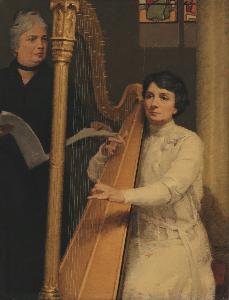Augusto Colombo
Augusto Colombo
สถานที่: Milan
เกิด: 1902
ความตาย: 1969
ชีวประวัติ:
Augusto Colombo was an Italian painter born in Milan in 1902 and died in 1969. He studied at the Brera Academy in Milan, where he was taught by prominent artists such as Giuseppe Palanti and Ambrogio Alciati. In 1924, he was awarded the Cesare Sarfatti Prize, which enabled him to spend two years in Rome, Florence, and Paris.
Early Career
After returning to Milan, Colombo took part in the city's exhibitions with portraits and large-scale compositions on social and religious subjects. He also opened an art school in his studio in 1933, which had over 800 pupils during its 36 years of operation. As a militant antifascist, he depicted the horrors of war in a series of works during World War II.
Artistic Style and Influences
Colombo's artistic style was influenced by his studies at the Brera Academy and his time spent in Rome, Florence, and Paris. He was known for his large-scale compositions on religious subjects, which were combined with numerous cycles of decorative works in later years. His work can be compared to that of other prominent Italian artists such as Carlo Carrà, who was also a co-founder of the Futurism movement.
Notable Works and Exhibitions
Some of Colombo's notable works include his portraits and large-scale compositions on social and religious subjects. His work can be found in various museums and galleries, including the Museo Nazionale in Palermo, Italy. For more information about Colombo's work and other Italian artists, visit Discover the Masterpieces of Museo Nazionale (Palermo, Italy).
Legacy
Colombo played a leading role in Milan's cultural life, founding the magazine Valori and promoting the activities of the Famiglia Meneghina organisation. His art school, which operated for 36 years, had a significant impact on the development of Italian art. For more information about Colombo's life and work, visit his page on Wikioo.org.
- Colombo was awarded the Cesare Sarfatti Prize in 1924.
- He opened an art school in his studio in 1933, which had over 800 pupils during its 36 years of operation.
- Colombo was a militant antifascist and depicted the horrors of war in a series of works during World War II.
was a prominent Italian painter who made significant contributions to the development of Italian art. His work can be found in various museums and galleries, including the Museo Nazionale in Palermo, Italy. For more information about Colombo's life and work, visit his page on Wikioo.org or Wikipedia.








